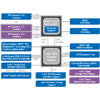- Qualcomm Launches Snapdragon 4 Gen 2 Mobile Platform
- AMD Launches Ryzen PRO 7000 Series Mobile & Desktop Platform
- Intel Launches Sleek Single-Slot Arc Pro A60 Workstation Graphics Card
- NVIDIA Announces Latest Ada Lovelace Additions: GeForce RTX 4060 Ti & RTX 4060
- Maxon Redshift With AMD Radeon GPU Rendering Support Now Available
Battle of the SATA 3.0 Controllers

With newer SSDs now coming well within 10% of maxing out a SATA 3.0 port, it’s important to make sure that your motherboard is properly equipped to handle such drives if planning to buy one. In our testing, while AMD’s and Intel’s solutions offered superb performance, Marvell’s leaved a bit (or a lot) to be desired.
Page 2 – Test System and Methodology; ATTO, PCMark, AS SSD
This isn’t going to be an in-depth article, as it doesn’t need to be. The message in general does need to be spread, however, because I could imagine that many will purchase these bleeding-edge SSDs for their aging motherboards and think nothing of it. I could honestly see myself falling into the same trap, evidenced by the fact that I had no idea what was going on when I first benchmarked the drive on my personal machine.
We’ll cover a couple of the potential reasons and non-reasons for the lacking performance of the Marvell controller in our conclusion, but for now we’ll go through all of the benchmarks, in order to get a better idea of where each controller stands. These benchmarks include ATTO 2.47, PCMark 7, HD Tune Pro 4.6, AS SSD 1.6.4 and Palimpsest Disk Utility (under Ubuntu 11.04 live CD).
To assure accurate results, all tests were run twice over, and in the same order. The Kingston SSD was securely erased under Ubuntu prior to each run of benchmarks. As SSDs are prone to slowing down as soon as the first benchmark is run, securely erasing the SSD before each run was imperative to help keep things fair. AHCI mode was used across the board, and the default power savings settings on each motherboard were left default.
As this is more of a quick article, we’re not going to go into great detail about the test systems used save for mentioning the GIGABYTE A75-ID4H and Sapphire PURE Z68 motherboards. If you have any questions about our methodologies or components used, please feel free to post in our related forum thread, where registration is not required.
Benchmark Results
Being that ATTO is the same benchmark many SSD vendors use to speed rate their products, it seems appropriate that we kick things off with the same.


AMD and Intel both came extremely close to the SSD’s rated 555MB/s read, while Intel nudged a bit ahead with a 7MB/s premium on the write. Marvell, as seen on the first page, suffers here in both the read and write regards. Interestingly, the Marvell’s 4KB performance is quite good given its other results.
PCMark 7 offers a break-down of its individual tests run, but for the sake of simplicity I’d opted to show just the overall storage score here. For those interested in the break-down, you can see the results in this article’s related forum thread.

In terms of all-around usage, it’s good to see that Marvell’s controller doesn’t lag too far behind here. As PCMark emulates real-world scenarios, it’s evident that Marvell’s horrible ATTO performance won’t always equate to horrible real-world performance, as would be expected.
Up next, the latest version of AS SSD, the benchmark specifically built for the unique characteristics of solid-state drives.



Intel’s SATA 3.0 controller has been performing extremely well up to this point, and we can see that nothing changes with AS SSD. AMD’s doesn’t fall too far behind; certainly not to the extent of the Marvell.
We’ll tackle HD Tune and Palimpsest on the following page.
Support our efforts! With ad revenue at an all-time low for written websites, we're relying more than ever on reader support to help us continue putting so much effort into this type of content. You can support us by becoming a Patron, or by using our Amazon shopping affiliate links listed through our articles. Thanks for your support!





